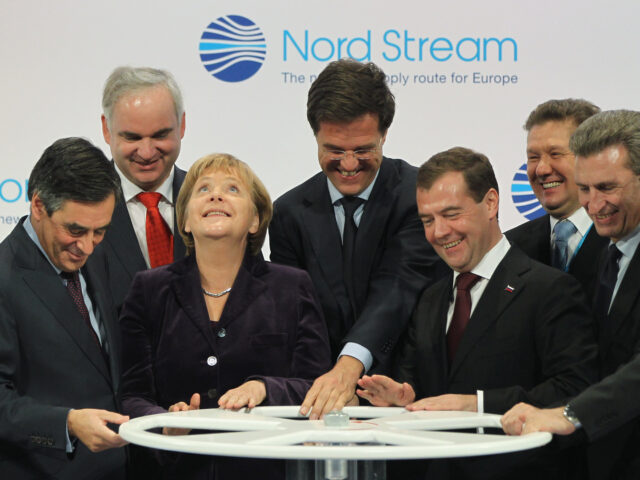The German government has declassified a damming risk assessment conducted just months prior to the February invasion of Ukraine in which the then-Merkel-led government determined that the nation’s energy security “won’t be jeopardised” by an increasing reliance on Russian gas.
In a stunning display of arrogance and shortsightedness from the German government, a classified security document produced in October of last year on the issue of the now-scuppered Nord Stream 2 pipeline, the government of Angela Merkel determined that “granting of certification [for Nord Stream 2] does not jeopardize the security of gas supply in Germany and the European Union.”
“For both the German and neighbouring markets, the risk of serious impairments to supply security due to the failure of individual import supply infrastructures is very limited,” the assessment added.
The release of the document was precipitated by journalists at the Der Speigel magazine threatening to sue the government to make it public, POLITICO reported. Following its release, the magazine dubbed the document “certificate of naivety” in light of the current energy crisis befalling Germany and other European nations for exactly the reason the document predicted would not come to pass.
While the current Social Democrat (SDP)-led coalition government has attempted to cast blame on Merkel’s Christian Democratic Union government, it is undercut by the fact that current Chancellor Olaf Scholz played a central part in Merkel’s government as vice chancellor and minister of finance between 2018 and 2021.
The document is further embarrassing for Chancellor Scholz as just this week, he claimed that he had always known that Vladimir Putin would use Germany’s energy dependence “as a weapon”, raising the question of why didn’t he speak out against the Nord Stream 2 pipeline while he was finance minister. Though Scholz ultimately scrapped the pipeline days before the invasion of Ukraine in February, he will likely face scrutiny over his role in its initial approval and his role in the risk assessment document.
German Federal Economy Minister Robert Habeck expressed concern over the looming energy crisis this winter, saying there is a possibility that Germany may run out of gas. https://t.co/4V2tO3Oo87
— Breitbart News (@BreitbartNews) October 3, 2022
Though the report acknowledged that there was a risk to shipments of gas through Ukraine, in favour of the Baltic sea pipelines, the government apparently did not see the possibility of Russia shutting down shipments through the Nord Stream 1 pipeline, which have ceased since September over alleged technical difficulties, though many observers claim that it was a retaliatory strike against the Germans for sending military aid to Ukraine and for shutting down Nord Stream 2.
This week, Russian President Vladimir Putin said that he would be willing to supply Germany gas through the hitherto unopened Nord Stream 2 pipeline after the first pipeline suffered sea leaks, which some attribute to an act of sabotage. It is still unclear who, if anyone, was behind the pipeline problems. Germany has so far refused new shipments through Nord Stream 2.
The declassified report did admit that there were objections to the use of Nord Stream 2, particularly from Poland and Ukraine, which noted that Gazprom had cut off supplies through Ukrainian pipelines in 2021. The German government determined that this was not a threat to them, however, saying that despite Gazprom being owned by the Russian state, it “only provides the transport infrastructure for suppliers and customers” and has no influence over the delivery of supplies.
Zero Self Awareness: Energy Protesters are Beginning of New ‘Fascist Movement’ – German PMhttps://t.co/rbebGMueau
— Breitbart London (@BreitbartLondon) October 13, 2022
Germany has long been warned of its over-reliance on Russian gas to fuel its economy, particularly by former US President Donald Trump, who said in 2018 that Nord Stream 2 would leave Germany “captive” to the political whims of Russia’s Vladimir Putin, who has previously used gas supplies as a means of pressuring rival nations.
Mr Trump was also critical of Angela Merkel’s predecessor, Gerhard Schröder — the SDP chancellor who initially approved the pipeline and who was later installed in a lucrative position as one of the top executives for the firm which constructed it.
The warnings were not heeded, however, with some German diplomats even openly laughing at the president when he raised concerns at the United Nations.
Now, the country is not laughing, as it is openly preparing for the potential of running out of gas this winter, threatening the lives of thousands of citizens and widespread unrest. Germany has already begun energy rationing in public buildings and this week passed a €200 billion gas price relief bill meant to hopefully alleviate the suffering of businesses and households impacted by the failure of foresight from the government.
The approval of the Nord Stream 2 pipeline from Russia is outgoing German Chancellor Angela Merkel’s “biggest mistake”, the former president of the EU Council said in comments backing up warnings from former President Donald Trump. https://t.co/MtjINbgPL8
— Breitbart News (@BreitbartNews) November 30, 2021
Follow Kurt Zindulka on Twitter here @KurtZindulka

COMMENTS
Please let us know if you're having issues with commenting.